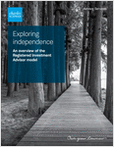What You Need to Know
- John Hancock will continue to administer the LTCI policies involved in the $4.4 billion deal.
- Global Atlantic will pass its share of the LTCI reinsurance risk to a company that has not yet been named.
- John Hancock noted that it is now offering cash buyouts as a standard option for policyholders facing premium increases.
Global Atlantic has agreed to take responsibility for a block of John Hancock long-term care insurance policies backed by $4.4 billion in reserves through a reinsurance agreement.
The LTCI reinsurance agreement is the biggest ever announced, and executives at John Hancock’s Toronto-based parent, Manulife Financial, said they hoped this deal would lead to more big LTCI reinsurance deal announcements soon.
The company is looking for a reinsurer for a similar block of LTCI business backed by about $2.8 billion in reserves, Mark Costantini, global head of in-force management, said Monday during a conference call Manulife held with securities analysts to talk about the deal.
Costantini said Manulife wanted the LTCI reinsurance deal with Global Atlantic to be the biggest ever. “We wanted to re-set the marketplace and the perception of long-term care insurance,” he told the analysts. “You’re setting the framework for future transactions.”
“We believe it makes an important step in establishing an active LTC reinsurance market,” Roy Gori, Manulife’s CEO, said during the same call.
What it means: The Global Atlantic-Manulife long-term care insurance reinsurance deal could be a sign of a recovery in the overall LTCI market.
Gori described the deal as part of an effort to dispose of unwanted legacy businesses and businesses with low earnings, but the existence of an active reinsurance market for LTCI policies could increase direct writers’ interest in selling your clients LTCI policies.
LTCI history: The individual and group long-term care insurance markets boomed in the 1980s and 1990s, as insurance company marketers saw that the aging of the baby boomers would eventually lead to a huge increase in the need for mechanisms for paying for care for older people.
Critics accused some insurers of charging too little for their coverage.
State LTCI rate increase control rules took effect as insurers’ blocks of LTCI business began to mature.
The issuers discovered that they had been overly optimistic about almost every assumption involved in creating the policies, including how high earnings on bonds would be, how many policyholders would keep their policies and how many insureds would use their coverage.
Most issuers left the U.S. LTCI market. John Hancock, which is based in Boston and helped create the modern U.S. LTCI market, stopped selling new individual LTCI policies in late 2016.
In recent years, there have been signs of a modest revival of the private LTCI market.
National Guardian Life has been expanding sales of a relatively new individual LTCI product, and insurers like Mutual of Omaha, New York Life and Thrivent continue to write new LTCI coverage.
Federal Life, Transamerica and John Hancock itself have all recently announced efforts to offer worksite life insurance policies to include built-in or optional access to benefits that can be used to pay for long-term care.
LTCI reinsurance history: Every quarter, securities analysts have asked any publicly traded insurers with LTCI policies on their books whether could reduce their LTCI risk by using reinsurance.
LTCI reinsurance deals have been rare.
CNO Financial made headlines in 2018 when it arranged for Wilton Re to reinsure an LTCI block backed by $2.8 billion in reserves.
Continental General has helped the direct writers shed unwanted LTCI business by buying Kanawha from Humana and arranging earlier this year to acquire a block of LTCI policies from Elevance Health, the health insurer formerly known as Anthem.
The Global Atlantic-Manulife deal: Global Atlantic is a New York-based affiliate of KKR.











 Copyright © 2024 ALM Global, LLC. All Rights Reserved.
Copyright © 2024 ALM Global, LLC. All Rights Reserved.